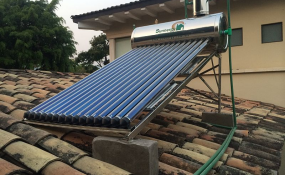Water outages to preselected suburbs by the City of Cape Town could lead to solar water geysers “exploding”, an electrical and electronic engineer warned on Thursday.
The City on Monday announced that Phase One of its Critical Water Shortages Disaster Plan came into effect which would cause water outages during peak water usage periods in the mornings and evenings.
Residents would be informed before water outages occur.
Professor Thinus Booysen from Stellenbosch University’s electrical and electronic engineering department said solar water geysers is dependent on cold water to regulate temperatures.
He said if water in the panel becomes too hot, or pressure too high, the safety valve opens which replaces hot water with cold water.
“In the event of a water outage, no cold water will replace the hot water, which could lead to overheating, and which could result in scalding (when hot water is used and it is beyond 100 degrees Celsius), and the solar system possibly stalling, which in turn could lead to explosions,” Booysen told News24.
Bradley McCallum from Skybridge Solar in Cape Town agreed, saying that the lifespan of roof solar water panels decreases drastically if left without water.
He said the panel’s absorber plate, which turns solar radiation into heat, will essentially be severely damaged if it overheats.
“It depends on the quality of your solar panel, but in lower quality ones you’ll see decreased heat from the panel within two to three weeks.”
McCallum warned that the city’s plan to decrease water pressure within its system would possibly lead to further damage.
‘All speculation at this moment’
He said if water pressure drops to below four bars, the solar water geyser is not going to operate.
“What would happen is that the valves won’t open up which means water won’t enter the panel to regulate the temperatures. The geyser won’t be receiving new cold water to heat during that time.
“This is all speculation at this moment, the city is still implementing lower pressure and this is the first time we are encountering this kind of problem.”
Sokolic Solar owner Andrew Sokolic said the glass tubes within solar panels are specifically susceptible to cracking when suddenly filled with cold water.
The issue could damage the geysers of thousands of solar water geyser owners across the city, Sokolic said.
The City of Cape Town failed to respond to detailed questions sent on Tuesday.
Gloria Mdleleni from Sustainable Energy Society of Southern Africa (Sessa) said the only way for solar water geyser owners to protect their solar water geysers is to cover up the panels until the water supply is restored.
Unlike an electrical geyser, a solar power geyser “can’t be switched off”, Mdleleni said.
Mdleleni, however, said no cases of solar geyser damage through water rationing have been reported.
“We will have to wait and see,” she said.

